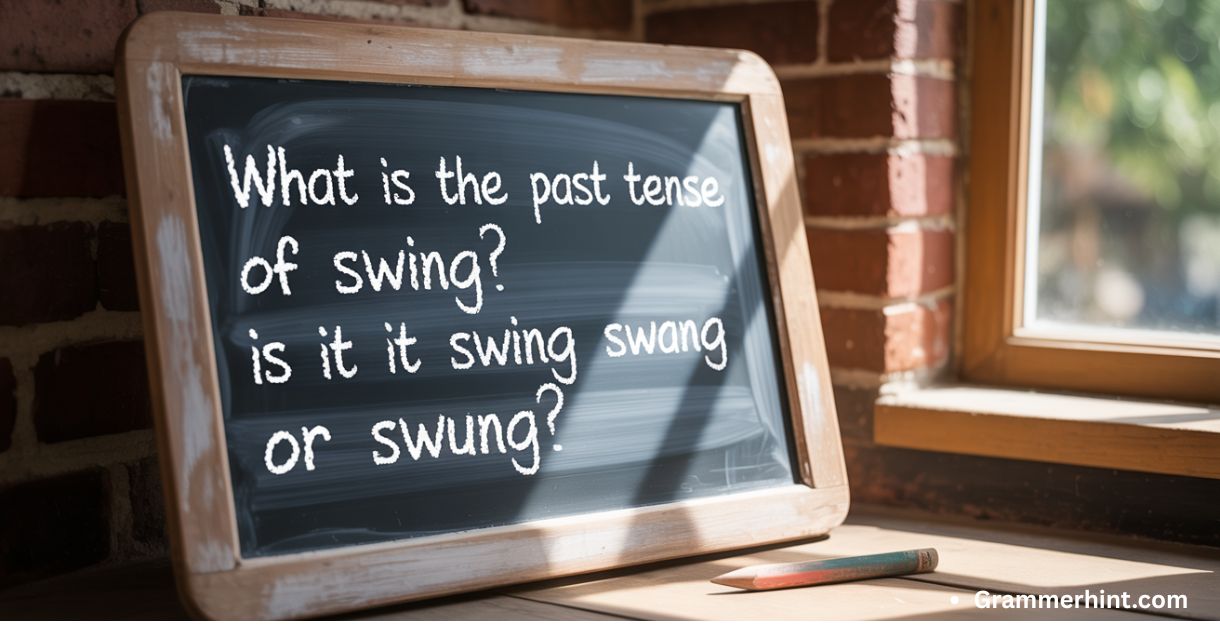When someone says, “He swing across the monkey bars yesterday,” something sounds off, right? That’s because the past tense of swing isn’t “swing.” But then again, is it “swang” or “swung”?
You’ve probably seen or heard all three in different settings, which makes the choice even trickier. This guide breaks down the swing past tense and past participle, the verb conjugation, and why certain forms have persisted or disappeared.
Let’s set the record straight.
Swing, swang or swung?

In casual speech, some people say swang“I swang on the rope like Tarzan.” It might sound colorful, even poetic. But is it grammatically correct? The short answer: No.
The correct past tense of swing is swung.
- “Yesterday, I swung the door open.”
- “He swung the bat with perfect timing.”
Swang is considered nonstandard and mostly dialectal. While it may appear in literature or regional dialects, it’s not accepted in formal writing or standard grammar.
What’s the past tense of “swing”?

You guessed it: swung is the standard past form of swing in modern English.
Why the past tense is “swung”?
The English verb swing is an irregular verb. That means it doesn’t follow the typical “-ed” ending pattern like “walk/walked” or “bake/baked.”
Let’s look at the verb forms in context:
- Present: I swing the hammer every morning.
- Past: Yesterday, I swung the hammer.
- Past Participle: I have swung that hammer hundreds of times.
Even though swang may sound correct to some ears, it has fallen out of favor. It once appeared in Old English verbs and dialects but is now largely obsolete.
How to pronounce “swing” and “swung”
Understanding verb pronunciation helps in mastering tenses and sounding fluent.
Pronouncing “swing”:
- /swɪŋ/
- Rhymes with “king”
Pronouncing “swung”:
- /swʌŋ/
- Rhymes with “hung”
If you’re unsure, online verb pronunciation guides and tools can help refine your speech.
What does the word “swing” mean?
Before diving further into tense and usage, let’s explore the swing meaning:
- To move back and forth or to and fro.
- To shift or cause to shift position.
- In sports, to strike with a sweeping motion.
- In mood or action, to shift from one state to another (e.g., swing from joy to anger).
The verb has evolved and taken on multiple meanings, depending on the linguistic context.
A simple tense table
Here’s a tense table to clarify the English verb forms for “swing”:
| Tense | Verb Form |
|---|---|
| Base Form | swing |
| Simple Past | swung |
| Past Participle | swung |
| Present Participle | swinging |
| 3rd Person Singular | swings |
Origin of the word “swing”
To appreciate how “swung” became the standard, consider the etymology of swing. The word traces back to the Old English “swingan,” meaning “to beat, strike or rush.” It shares roots with German “schwingen” and Dutch “zwengen.”
Historically, English verbs underwent strong and weak conjugations. Over time, irregular patterns like swung prevailed due to common usage and grammatical tense rules.
Using “swing” and “swung” in sentences
Context matters. Let’s see how both forms behave in everyday writing.
Using “swing” in a sentence:
Email Example
Subject: Playground Inspection Update
Hi Martha,
I just wanted to let you know that the new tire swings we installed on the east side are a big hit with the kids. One student mentioned how smoothly it swings back and forth compared to the older model.
Best,
Caleb
Using “swung” in a sentence:
Email Example
Subject: Incident on Recess Duty
Hello Mr. Daniels,
During recess today, a student accidentally swung the jump rope too hard and hit another student. I’ve addressed the issue, and both are fine now, but I wanted to keep you in the loop.
Regards,
Angela
These examples clarify how the past participle of swing fits naturally in modern usage.
Synonyms of “swing” and “swung”
Synonyms for “swing”:
- sway
- arc
- oscillate
- dangle
- whirl
- pivot
- rotated
- shifted
- swept
- twirled
- tilted
Knowing these synonyms of swing and swung can help improve your writing style and offer word variety.
Sources
- Oxford English Dictionary
- Cambridge Dictionary
- Merriam-Webster
- Grammar Monster – Irregular Verbs List
- Purdue OWL – Grammar Tips
Final Thoughts
The correct past tense of swing is swung. Not “swang,” and certainly not “swing.” Understanding the difference between swung and swing comes down to mastering irregular verbs, learning the verb tenses in English, and recognizing grammar misconceptions that trip many people up.
Use swung in the past. Use swing in the present. And remember, even native speakers make common verb mistakes now and then. But you don’t have to.
Let the grammar rules work for you, not against you.









